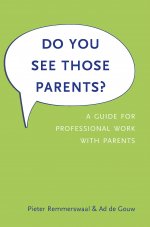
Do you see those parents? - A guide for professional work with parents
Omschrijving
This book is a translation of the Dutch version which was edited in 2017 (and reprinted in 2020) with the title: Snap jij die ouders? Basisboek professioneel werken met ouders.
This book is used in a number of universities in Belgium, the Netherlands and on Dutch Caribbean islands. In the course of an international parenting program of different universities in Europe, participants inquired repeatedly about an English version of our book. This edition answers to that question.
But how to translate the different meanings of the first part of the Dutch title into proper English? And also in such a way it can be well understood in other European countries as the special focus of this book? Let us take you shortly along our process of decision making, how to translate the above title.
The second part of the title is the easiest to translate: A guide for professionals working with parents. Let us be clear from the start: This book is not about helping parents raising their children. About the content later more, but now shortly about the second part of the Dutch title which seems to have much more possibilities for translation. “Do you understand those parents?”, would be a first option. This can be read as an invitation to try and understand parents, parenthood or parenting of a person, a couple or a group. The first title part in the Dutch version often has an association of difficulty how to understand parents. Or even stronger: the underlying connotation of this question of quickly criticizing their actions and even the tendency to blame them. This question we often heard from students, social workers and from members of different professions in multidisciplinary consulting teams. Our question in reaction : “What is your view of these parents?” was very often followed by a rather negative view on their parenting, based on the assumption: “Why don’t they see the needs of their child?” Apparently for a professional it is more common to keep in mind the vulnerability of a child than that of a parent. The challenge for a great number of care workers who meet children and their parents seems obviously: how to be open minded towards parents?
Professionally and parent focussed working with parents is, to our opinion, a question of perspective of the professional. We all tend to look at parents firstly from our professional view on the needs of a child, we call that the child-perspective. But parenthood is more than bringing up a child or knowing how to help them in their growth, also called parenting. Although parents themselves also see as their core business: raising and educating their own child, they are also individuals, partners, family members, and a number of other social roles as a member of the society. For that reason we did choose as the main title: “Do you see those parents?” For trying to take their perspective is primarily seeing their normal daily struggle, with their specific circumstances, their personalities, their histories, their beliefs, their doubts and weaknesses and, last but not least, their possibilities. So, this book does not consider the question: “How to help parents to become better educators?” We try to avoid the word parenting and if we do so in this book, we use it in the meaning of educating their child. But once again, that is not the main focus of this book. Trying to help professionals to support parents in their improving of strength in their parenthood is our first goal.
Every family has its own culture, and every person is part of more cultures, local, regional, national and even international. Cultural aspects always count, also in parenthood, but discussing them all would result in a very different content of this book. We try to give general support to students and workers of very different professions and in very different countries and cultures. We do not mention those separately, but we focus in this book on aspects of parenthood which are more or less universal, without generalising parenthood in all different countries and cultures. Our experiences in working with parents was mainly in Holland and Western Europe, so our examples are mostly from this cultural background. We use them not as an example for others how to work, of how to treat parents, but to explain our use in practice of the theory on parenthood which inspired us for so many years. We hope that reading about the use of this theory and our experiences with it will offer support and inspiration to a great number of care workers and professionals in very different disciplines in their daily work. And especially for lecturers, teachers and trainers of students and coaches of professionals who work with children and subsequently with parents to help them to improve their professional attitude toward parents.
About the authors
Pieter Remmerswaal was for a long period parent counsellor, family therapist, training coordinator and senior supervisor in ambulatory and residential child and adolescent psychiatry and trainer/supervisor/coach in his own practice. He was co-founder and deputy editor-in-chief of Ouderschapskennis (Professional Magazine Knowledge of parenthood), formerly 'Ouderschap & Ouderbegeleiding' (Parenthood & Parental Guidance).
E-mail: p.remmerswaal@xs4all.nl
Ad de Gouw worked as a child care worker, parent- and family-counsellor, senior coach and supervisor in ambulatory and residential youth care and was the editorial secretary of the Professional Magazine Knowledge of parenthood (see above) He has also been a foster parent for many years.
